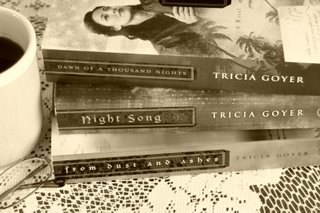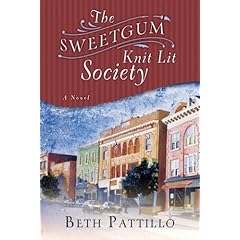Taken from Susan May Warren's and Rachel Hauck's
My Book Therapy!
Part 1:
SUSPENSE! The Big EventOkay, so you’ve introduced your hero and heroine, and the stakes of the story, even hinted at their fears at the outset of the book…now, how do you weave in the SUSPENSE.
First, let’s take a look at the defition of a suspense:
An everyday hero or heroine confronts a believable, compelling, immediate and terrifying threat, and using their unique abilities, learning more, confronting their own lies and eventually finding a new strength, they overcome and win the day.
The key to that definition is the word: EVENT
E - Event – The EVENT in a suspense is the bad thing that will happen if the hero/heroine don’t stop it. It’s what is at STAKE in the story that propels our h/hn to face their darkest fears, summon their courage and defeat the bad guy.
The EVENT is the key to a great suspense and needs to present a Believable, Compelling, Immediate, & Terrifying Threat
Whether the event that is/will happen is caused by natural elements (ie, a storm (The Perfect Storm), or a volcano (Dante’s Peak) or a villain – it needs to have four components.
It must be:1. Believable – We need to believe that this COULD happen. We need to believe that the threat is real, and deadly. We need to believe that the bad guy WILL pull the trigger, or detonate the bomb, or that the volcano will erupt.
One way to increase the believability is to show the event happening at the beginning of the book, in another time or place. ie, in Dante’s Peak the first scenes show the volcano erupting in another country and causing the death of the hero’s girlfriend. In one of my favorite Romantic Suspense movies – Bird on a Wire, we see the bad guy getting out of jail, and we know he’s a bad dude…mostly because of his threats and he’s clearly done time for a previous conviction and hasn’t changed his ways. Not only that, but he attacks Mel and blows up the garage where Mel is hiding out, and kills his boss…he’s serious about his threat.
Make your event BELEIVABLE.
2. Compelling – A compelling Event is one that is personal, and affects the life of the her or heroine. At some point in the story – preferably near the beginning, it needs to get personal. Either they walk in on the situation/crime, or they are the targets, or they are caught up in it. This compelling aspect can be peripheral – meaning it can affect loved ones — (this is why romantic suspense works so well) or it can be direct. But they need to care about stopping it, and in order to make them (and us) care, make it personal.
Along that line, it also needs to be reasonable. You’re not going to be afraid of a volcano erupting on your mother if she lives in North Dakota. If she lives in Hawaii…different story. In Dante’s Peak, the story turns personal when the children go after their grandmother on the mountain and get caught in the lava flow. In Bird on a Wire, of course it gets personal for Goldie when she finds the man she’s always loved and discovers he’s in danger.
Make it COMPELLING – Personal and Reasonable3. The Event needs to also be Immediate – There must be a deadline. The reader (and the hero/heroine) have to believe that the threat will happen, and happen soon. In Dante’s Peak, it’s the boiling gasses in the hot springs, and the fact that the volcano guys know it’s going to happen soon. In Bird on a Wire, clearly someone is hot on their trail, and they need to get to the one guy who can help before he is killed.
Somewhere in the middle of the book you need to start a ticking clock or countdown to the big bang. Whether it’s the mounting pressure inside the volcano, or the harried hostage taker losing his patience, or the plane running out of fuel, there needs to be an increasing immediacy.
Sometimes even the hero/heroine don’t know how immediate this threat is – but make sure the reader does (and even better if they’re yelling at the character in the quiet of their own room!)
Start the Clock – and make it IMMEDIATEFinally…
4. Terrifying – We need to believe that this event is a horrible thing. This is different from believing it can happen. It’s answering the questions — so what? If it happens, how does it affect me?
You make it terrifying by looking at two different perspectives – personal and public fears.
Personal fears are all about losing someone we love – a family member – a wife, child, something we all fear. In Bird on a Wire, the fear is that they won’t get to live happily ever after, that their one true love will die.
The Public fear is about how devastating the event is, and who is affected. (And if you can throw in someone in the personal circle, that ups the effect). Ie – in Dante’s Peak – the grandmother is burned to death (basically) and now we know how horrible it would be for someone – anyone to die this way.
In one of my favorite suspense, Air Force One, Glenn Close explains the terror when she says, “if we give into this threat, we’ll have terrorists crawling out of the woodwork.”
The reader needs to understand why this threat is scary – threaten the children, take out a government, kill a granny, give an entire town a contagious disease, and then wipe it out. Make dinosaurs eat people. Show us why it would be horrible if it happened.
Make it TERRIFYING.Creating that four part event will cause your reader (and your hero/heroine) to stay in the story until the bitter (and hopefully Event-Less!) end.
Tomorrow, I’m going to share with you a few TRICKS to writing suspense….
Thanks for all the submissions last week on your favorite suspense novel/book! Keep them coming – we’ll compile them on Friday!
Rachel here: These are amazing writing tips. Some of you might be saying, “Hm, I don’t write suspense.” All of these tips work. Don’t tune out and think this doesn’t apply to you. Think about your romance, your women’s fiction, your family saga. You need the EVENT, the believable, the immediate, the compelling and the terrifying, or perhaps better said, the devastating element bearing down on your hero and heroine.
Stakes always need to be high and continually raised in our stories. What can force your protagonist to the edge? What will bring them back?
Happy writing!
 We have an agent's perspective today in the series, Kelly Mortimer: Everyone hears, "Follow your dream and never give up." I'm a firm believer in dreams, and I don't give up, but my advice would be to make sure you know how to write BEFORE you submit to every agent/editor on the planet.
We have an agent's perspective today in the series, Kelly Mortimer: Everyone hears, "Follow your dream and never give up." I'm a firm believer in dreams, and I don't give up, but my advice would be to make sure you know how to write BEFORE you submit to every agent/editor on the planet.











